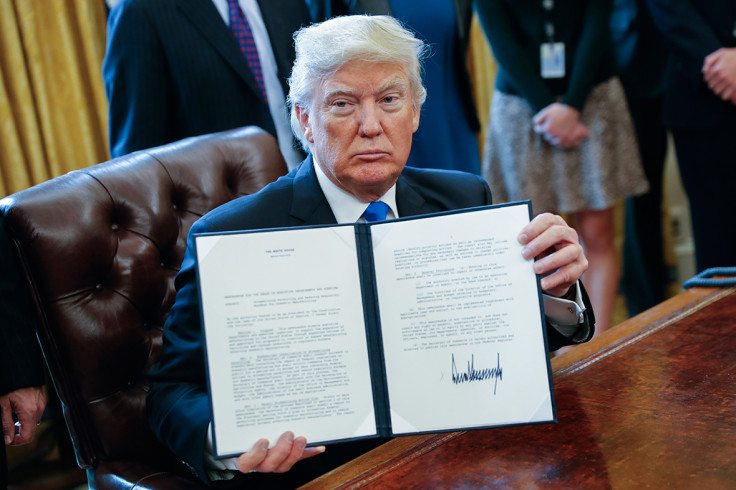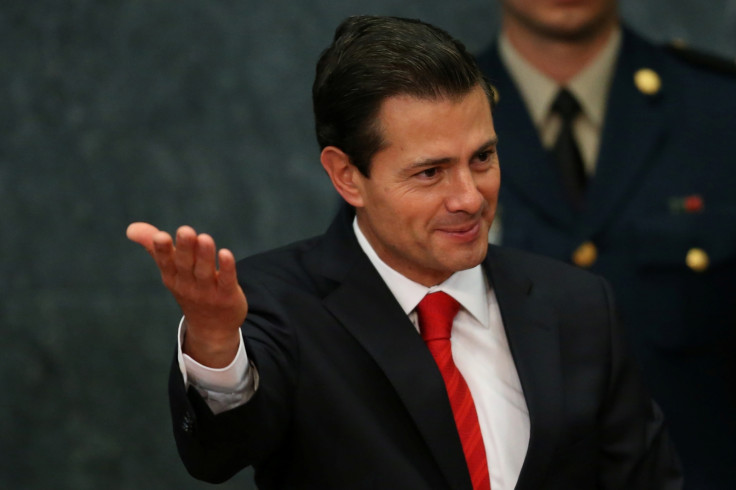Trump's first week as president: Seven disasters in seven days
Since his inauguration, Trump has put pen to paper on a flurry of legally-binding orders.

Donald Trump has only been president for a week but has already signed a smorgasbord of controversial executive orders which appear to put paid to human rights in the United States and the rest of the world.
From advocating waterboarding to denying some of the world's poorest women access to safe abortions and healthcare, Trump has put pen to paper on a flurry of legally-binding orders in line with his election campaign rhetoric.
His reign has only just begun, but here are seven of the key executive orders Trump has signed over seven days.
Publicly advocating use of waterboarding
On Thursday, a leaked draft of an order obtained by the New York Times revealed the Trump administration could reopen George W Bush-era 'black site' prisons, which would allow the CIA to brutally interrogate terror suspects overseas.
Speaking to ABC News, Trump said he believes waterboarding works as an interrogation technique, stating "we have to fight fire with fire".
Start rolling back Obamacare
Shortly after Trump's inauguration, he began the process of unravelling the Affordable Care Act – something he pledged to do throughout the presidential race. This was his first executive order, which instructed the federal government to dismantle Obamacare "to the maximum extent permitted by law".
The order mandates federal agencies to "exercise all authority and discretion available to them to waive, defer, grant exemptions from, or delay the implementation of any provision or requirement of the Act that would impose a fiscal burden on individuals, families, healthcare providers, health insurers, patients, recipients of healthcare services, purchasers of health insurance, or makers of medical devices, products, or medications."
This is confusing, to say the least, but it effectively means the Trump administration can tweak the guidelines that allow agencies, states and insurance companies to implement Obamacare. It isn't expected to have much of a tangible effect on the ACA at the moment, but the move hints at more to come and a symbolic first act for the president.
Deny women around the world safe healthcare
Just days after millions of women took to the streets in protest of Trump and his election campaign, the leader reinstated the Mexico City Policy – an anti-abortion order which would effectively prevent the world's poorest women from accessing safe abortions and reproductive healthcare.
Otherwise known as the global gag rule, it blocks US funding to international NGOs that provide family planning services, which forces organisations that provide terminations to either stop providing abortions or lose funding from the government – even if the funding supports other life-saving medical care.
Past presidents have gone back and forth over the Mexico City Policy. Introduced in 1984 by Ronald Reagan, it was repealed under Bill Clinton, reinstated once again by George W Bush before being repealed by Barack Obama.

Scientists have been gagged
Trump is renowned for being a climate sceptic, among many other things, once famously claiming global warming was a hoax conjured by the Chinese. Scientists have long-anticipated big changes under his administration that began this week.
The Trump administration has mandated that any studies or data from scientists at the Environmental Protection Agency should be reviewed by political appointees before being released to the public.
Trump's government has also ordered the EPA's communications team to remove the climate change page from its website, which contains links to scientific research on global warming and emissions, according to Reuters,
Unblocked the Dakota pipeline
Against opposition by both Native Americans and environmental activists, Trump signed an executive order that supported two controversial oil pipelines – the Keystone XL and Dakota Access projects.
Barack Obama had previously rejected the Keystone project, which would bring oil from Canada to refineries in the US, cutting across land near the Standing Rock Sioux reservation. Construction was blocked last year after massive protests on the land by the tribe, as well as climate activists.
Trump backed the projects on the basis that US steel is used, saying it would generate "a lot of jobs, 28,000 jobs. Great construction jobs."
The State Department expects the project will only result in a few permanent jobs that last past construction. Politifact estimates the number of long-term jobs at just 50.
Pushed ahead with a 'Muslim ban'
Leaked drafts of executive orders show Trump has begun the process of temporarily blocking people from certain Muslim-majority countries from entering the US, including Iraq, Iran, Libya, Somalia, Sudan, Syria and Yemen. This was one of Trump's key campaign pledges, which he argued would protect American people from terrorism.
In one of the harshest crackdowns on immigration, the order would also bar refugees from the rest of the world from entering the US for at least 120 days. Another executive order signed by Trump will increase the number of immigration enforcement officials who can carry out deportations.
Begun the process of building a wall between US and Mexico
On Wednesday, Trump announced he had signed an executive order which gave the go-ahead for the construction of a wall on on the border of the US and Mexico. He says the move will "improve safety in both countries" – adding it would be "very, very good for Mexico".
"We are going to get the bad ones out, the criminals and drug dealers and gangs and gang members and cartel leaders – the day is over when they can stay in our country and wreak havoc," Trump said.
The president has maintained Mexico will pay for the wall, despite repeat messages from President Enrique Pena Nieto that this will not happen. For the construction for the 2,000-mile wall to go ahead, Congress would have to approve funding for the structure, which is estimated to cost billions of dollars.
© Copyright IBTimes 2025. All rights reserved.





















